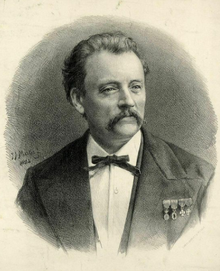Richard Hol
Richard Hol (born July 23, 1825 in Amsterdam , † May 14, 1904 in Utrecht , actually Rijk Holle ) was a Dutch composer , conductor , music teacher , music writer and father of the musicologist Johannes Cornelis Hol .
Hol, who was actually called Rijk Holle, initially studied organ with JM Martens and from 1837 to 1844 piano at the Royal Music School in Amsterdam with Jan George Bertelman . After completing his studies, he went on an extensive concert tour in 1845, which took him through the Netherlands and Germany , among other places ; It was during this time that the name was changed from "Rijk Holle" to "Richard Hol".
After returning to the Netherlands, Hol settled in Amsterdam . Hol taught piano here and also carried out other activities: from 1856 to 1871 he was the conductor of the Amstels mannenkoor and from 1857 to 1862 he was head of the Amsterdam section of the Maatschappij tot Bevordering der Toonkunst ; The beginning of his compositional work also falls in this phase of his life.
In 1862 Hol moved to Utrecht . From 1862 until his death in 1904 he headed the Municipal Music Orchestra ( Collegium Musicum Ultrajectinum ) as music director in the successor to Johann Hermann Kufferath , gave lessons at the municipal singing school and from 1863 had also headed the Utrecht section of the Maatschappij tot Bevordering der Toon art; Hol was also active as cathedral organist from 1869 to 1887 .
When the Municipal Music School was founded in Utrecht in 1875, Hol was appointed its first director (1875–1904); In addition to managing the institution, Hol was also active there in a teaching capacity until 1887 (including in the subjects of singing and music theory); among his students there were u. a. Willem Mengelberg and Johan Wagenaar . Hol also became its first chairman when the Nederlandsche Toonkunstenaars-Vereeniging was founded in the same year 1875 .
From 1886 to 1898, Hol succeeded Johannes Verhulst as conductor of the Diligentia Concerten in The Hague , after he had taken over the direction of the Cecilia men's choir in the same city in 1878, which he directed until 1901.
From 1891 to 1893 Hol was also the conductor of the concerts that were performed in the Paleis voor Volksvlijt in Amsterdam ; During this time he shared the direction of the concerts with Frans Coenen .
In addition to his work as a conductor, teacher and composer, Hol was also active as a writer. In 1859 he published a monograph on Jan Pieterszoon Sweelinck ( Sweelingh, Jaarboekje aan de toonkunst in Nederland gewijd, Amsterdam 1859 ), wrote reviews in the Dutch music magazine “Cæcilia” and was editor of the magazine Het Orgel from 1886 to 1890 .
Finally, the influence that Hol had on musical life and development in the Netherlands should be pointed out; Hol was not only able to develop this influence through his teaching activities, which shaped a number of students such as the aforementioned Willem Mengelberg . His work as a conductor in Utrecht and later the important concert series in Amsterdam and The Hague allowed Hol to write his doctorate works by composers he valued - for example Franz Liszt , Richard Wagner and Hector Berlioz (which of course was not a hindrance that Hol was able to win over such important soloists as Joseph Joachim and Johannes Brahms for his concerts ). The fact that Hol enjoyed not only national but also international recognition as an authority in the field of music theory and practice may illustrate the fact that he had been a member of the Académie française since 1878 .
Hol's own compositional oeuvre, comprising more than 125 works, is assessed by research as conservative (probably in contrast to the oeuvre of his colleagues Berlioz, Liszt and Wagner, who were valued by Hol) and assigned to the Leipzig School ; there are influences of Felix Mendelssohn Bartholdy and Robert Schumann . The focus of Hol's compositional work was on vocal works; especially his compositions for male choir enjoyed a certain popularity for a long time. Hol also composed four symphonies, piano and organ works, two operas - Floris V (1892); Uit de branding (1894), psalm settings, cantatas, an oratorio - David (1879) - and two masses.
Literature sources
- Friedrich Blume (Ed.), MGG Supplement Vol. 16 Earsden - Zweibrücken (Kassel 1979) Col. 721–722 sv Hol, Richard (Clemens Chr. J. von Gleich)
- Wilibald Gurlitt (Ed.), Riemann Musiklexikon, personal section A – K (Mainz 1959) 815 sv Hol, Richard
- Stanley Sadie (Ed.), New Grove Dictionary of Music and Musicians, Vol. 8 H to Hyporchēma (London 1980) 641 sv Hol, Richard (Jan ten Bokum).
Web links
| personal data | |
|---|---|
| SURNAME | Hol, Richard |
| ALTERNATIVE NAMES | Holle, Rijk (real name) |
| BRIEF DESCRIPTION | Dutch composer |
| DATE OF BIRTH | July 23, 1825 |
| PLACE OF BIRTH | Amsterdam |
| DATE OF DEATH | July 23, 1904 |
| Place of death | Utrecht |
